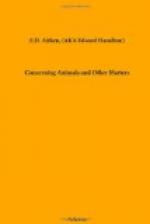There is a farmhouse, any common farmhouse, just one of the molecules that constitute the mass of our wholesome country life. A horse is being harnessed for the plough: its ancestors sniffed the wind on the steppes of Tartary. Meek cows are standing to be milked: when primitive man first knew them in their native forests he used to give them a wide berth, for his flint arrows fell harmless off their tough hides, and they were fierce exceedingly. A cock is crowing on the fence as if the whole farm belonged to himself: he ought to be skulking in an Indian jungle. The sheep have no business here; their place is on the rocky mountains of Asia. As for the dog, it is difficult to assign it a country, for it owns no wild kindred in any part of the world, but it ought at least to be worrying the sheep. If there is an ass, it is a native of Abyssinia, and the Turkeys are Americans. The cat derives its descent from an Egyptian.
But all these are of one country now and of one religion. They know no home nor desire any, except the farmhouse, in which they were born and bred, and the lord of it is their lord, to whom they look for food and protection. And what would he do without them? What should we do without them? It is impossible to conceive that life could be carried on if we were deprived of these obedient and uncomplaining servants. High civilisation has been attained without steam engines; education, as we use the term now, is superfluous—Runjeet Singh, the Lion of the Punjab, could neither read nor write; the human race has prospered and multiplied without the knowledge of iron; but we know of no time when man did without domestic animals.
It is vain to speculate how the thing first came about, whether the sportive anthropoid ape took to riding on a wild goat before he emerged as a man keeping flocks, or whether some great pioneer, destined to be worshipped in after ages as a demigod, showed his fellows how the wild calves, if taken young, might be trained into tractable slaves; and it is hopeless to expect that any record will now leap to light which will give us knowledge in place of speculation. But it might not be unprofitable to seek for some clue to the strange selection which the domesticating genius of man has made from among the multifarious material presented to it by the animal kingdom. If we do so we shall almost be forced to the conclusion that domesticability is a character, or quality, inherent in some animals and entirely wanting in others.
Let us begin with pigeons, a very large group, but one that shows more unity than any of the other Orders into which naturalists divide birds. It embraces turtle doves of many species, wood pigeons, ground pigeons, fruit pigeons and some strange forms like the great crowned pigeon of Victoria. Of all these only one, the common blue rock, has been domesticated. The ring dove of Asia has been kept as a cage bird for so long that a permanent albino and also a fawn-coloured




